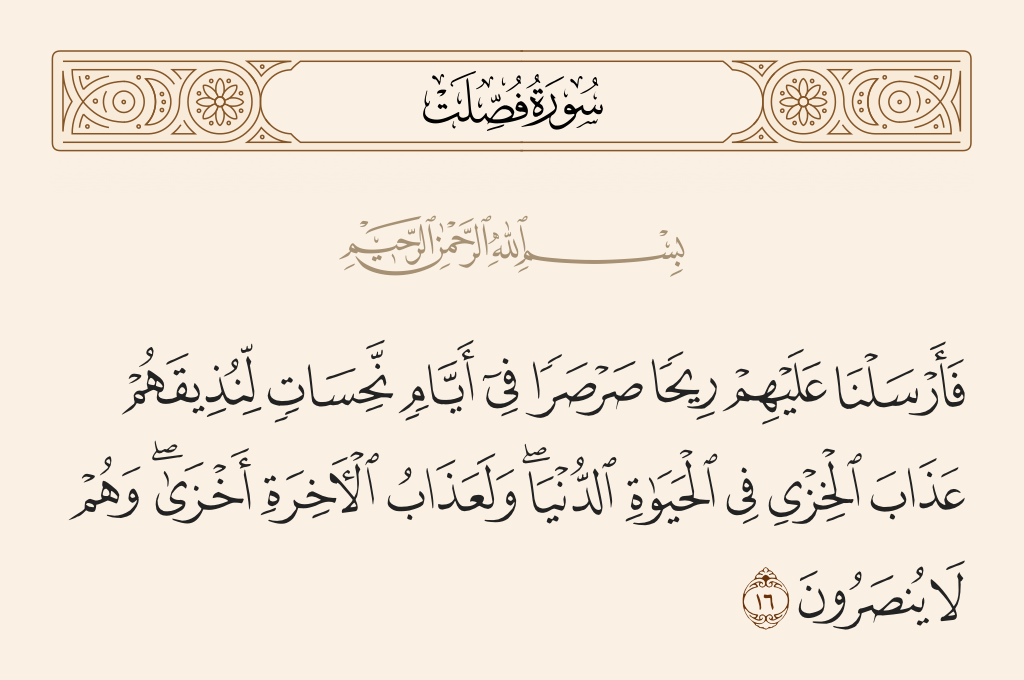Surat Fussilat Verse No. 16: Reading and listening
Translation of the verse 16 from Surah Fussilat : Number of verses 54 - - page 478 - Part 24.

﴾فَأَرۡسَلۡنَا عَلَيۡهِمۡ رِيحٗا صَرۡصَرٗا فِيٓ أَيَّامٖ نَّحِسَاتٖ لِّنُذِيقَهُمۡ عَذَابَ ٱلۡخِزۡيِ فِي ٱلۡحَيَوٰةِ ٱلدُّنۡيَاۖ وَلَعَذَابُ ٱلۡأٓخِرَةِ أَخۡزَىٰۖ وَهُمۡ لَا يُنصَرُونَ ﴿
[ فصلت: 16]
So We sent upon them furious wind in days of evil omen (for them) that We might give them a taste of disgracing torment in this present worldly life, but surely the torment of the Hereafter will be more disgracing, and they will never be helped.
English - Sahih International
So We sent upon them a screaming wind during days of misfortune to make them taste the punishment of disgrace in the worldly life; but the punishment of the Hereafter is more disgracing, and they will not be helped.
Tafheem-ul-Quran by Syed Abu-al-A'la Maududi
(41:16) whereupon We sent upon them a fierce wind on inauspicious days *20 that We might make them taste a degrading chastisement in the life of this world. *21 And surely the chastisement of the Hereafter is even more degrading. There will be none to help them there.
Tafheem-ul-Quran by Syed Abu-al-A'la Maududi
*20) "III-omened days" does not mean that the days in themselves were illomened, and the torrent came because the people of 'Ad met with those illomened days. If this were the meaning and there were some ill omen in the days themselves, the torment would have visited all the nations of the world. The cornet meaning, therefore, is that since in those days God's torment descended on this nation, the days were ill-omened for the people of 'Ad. It is not cornet to argue on the basis of the verse that some days are iII-omened and some auspicious. The lexicographers have disputed the meaning of the words rih-an sarsaran, which have been used for the stormy wind. Some say that they imply an intensely hot wind; others say that they imply an extremely cold wind; and some others say that they imply a wind which produces a great noise when it blows. In any cast, they All agree that the words are used for a severe storm. The details of this torment given at other places in the Qur'an show that this wind continued to rage for seven nights and eight days consecutively. It swept the people off the ground and they fell down dead and lay scattered here and there like hollow trunks of the palm-tree. (AI-Haaqqah: 7). It left rotting everything on which it blew. (Adh-Dhariyat 42). When the people of 'Ad saw it advancing, they rejoiced with the hope that the dense clouds would bring much rain, which would water their withering crops. But when it came it laid waste the entire land." (Al-Ahqaf: 24-25).
*21) This ignominious torment was an answer to their arrogance and vanity because of which they had assumed greatness in the land without any right, and would boast that there was none more powerful than they on the entire earth. Allah disgraced them and destroyed the major part of their population along with their civilization. The remnant of their population was humbled and debased before those very nations whom they used to overawe by their show of power and might (for the details of the story of 'Ad see AI-A'raf : 65-72; Hud: 50-60; AlMu'minun: 32-41; Ash-Shua'ra' : 123-140; AI-'Ankabut; 40 and the relevant E.N.'s).